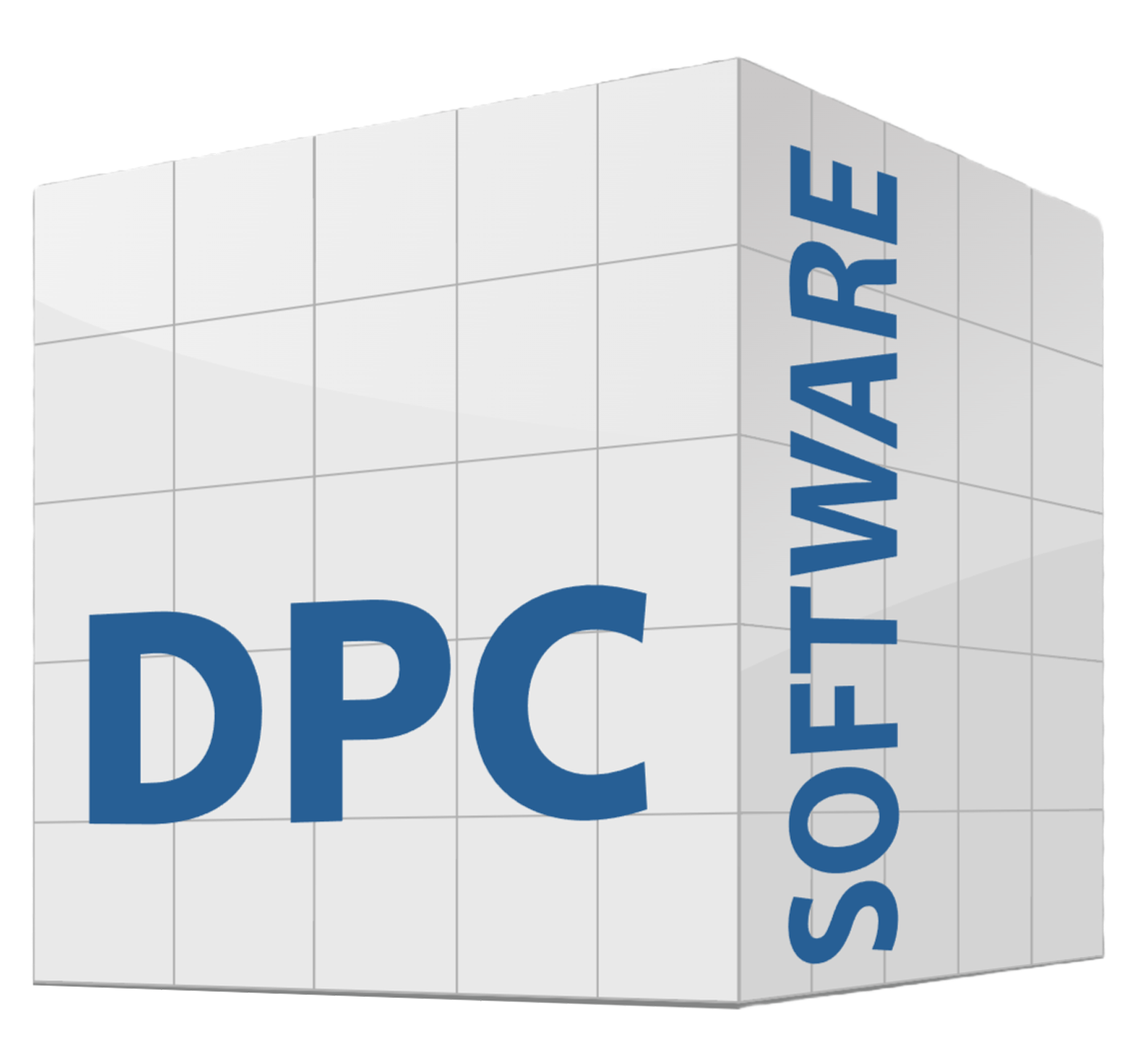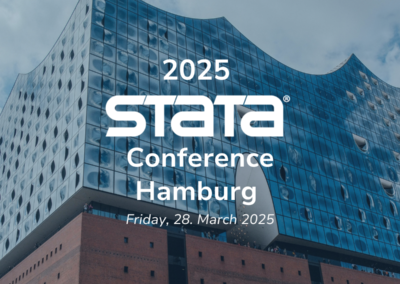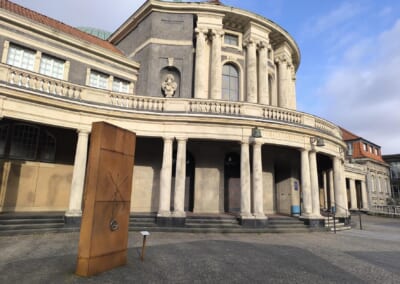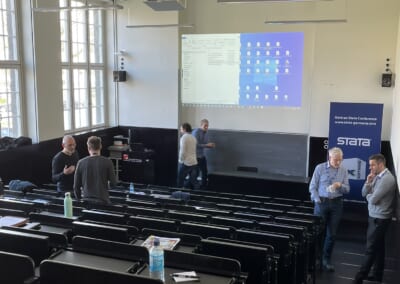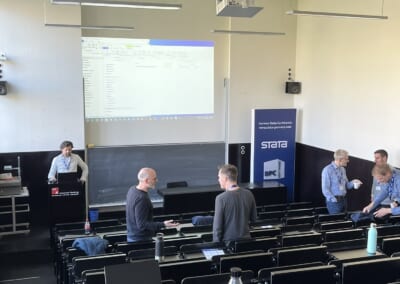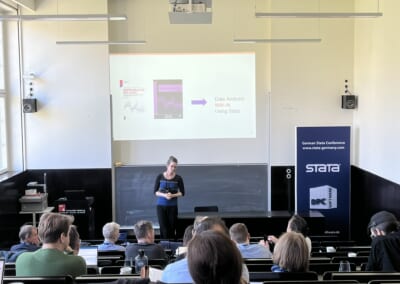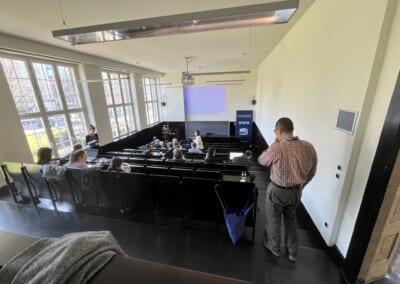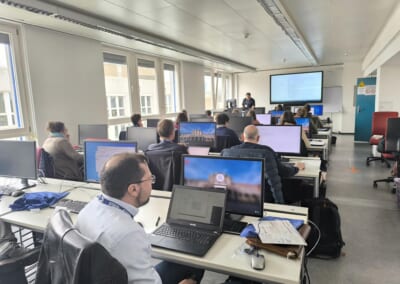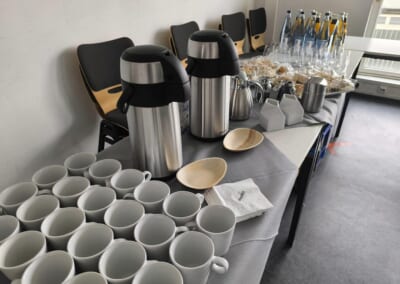German Stata Conference 2025 – Report
Friday, March 28, 2025 at University of Hamburg
Report German Stata Conference 2025
On March 27–28, 2025, the DPC Software Gmbh hosted the 22nd German Stata Conference at the University of Hamburg – an inspiring event for everyone passionate about Stata, statistical methods, and data-driven research. Participants from academia, industry, and public institutions came together to share ideas, learn from each other, and explore new developments in data analysis.
Workshop: Writing, Analyzing, and Presenting – Seamlessly Connected
The conference began with a full-day workshop titled „Interaction between Text Writing and Statistical Analysis: Result Export and Dynamic Documents with Stata“, led by Dr. Christian Brzinsky-Fay (University of Hamburg). More than 20 participants joined the session, diving deep into the creation of dynamic documents in Stata. The focus was on integrating statistical analysis, text writing, and result documentation into one continuous workflow — a topic highly relevant for both academic research and practical applications. The workshop offered a productive learning environment, lively discussions, and many practical „aha“ moments that participants will surely carry into their future work.
Conference Day: Inspiring Insights into the Future of Data Analysis
On the second day, the conference opened its doors to a broader audience with a diverse program featuring insightful talks from research and practice. A particular highlight was the keynote by Prof. Dr. Frauke Kreuter, a renowned expert in statistics and data science, on the topic „Co-Creating with AI: The Role of LLMs as Intelligent Data Science Agents.“ Prof. Kreuter explored the growing role of Large Language Models (LLMs) in data-driven research, illustrating how AI can increasingly act as a co-author and analysis partner. Her presentation resonated strongly with the audience, sparking lively discussions about the evolving collaboration between humans, machines, and methodologies.
In addition to the keynote, numerous other contributions enriched the conference program, covering a wide range of topics — from methodological innovations to practical tips for working with Stata. This diversity made for a truly dynamic and engaging conference experience.
The 22nd German Stata Conference 2025 was a great success — marked by intellectual depth, vibrant exchanges, and the strong community spirit that defines the Stata user base. Special thanks go to the University of Hamburg for their excellent organization and warm hospitality. We are already looking forward to next year’s conference!
Report German Stata Conference 2025
Am 27. und 28. März 2025 veranstaltete die DPC Software an der Uni Hamburg die 22. German Stata Conference – ein Highlight für alle, die mit Stata arbeiten oder sich für statistische Methoden und Anwendungen interessieren.
Workshop: Schreiben, analysieren, präsentieren – alles in einem Fluss
Den Auftakt bildete ein ganztägiger Workshop unter dem Titel „Interaction between Text Writing and Statistical Analysis: Result Export and Dynamic Documents with Stata“, geleitet von Dr. Christian Brzinsky-Fay (Universität Hamburg). Über 20 Teilnehmende fanden sich zusammen, um sich intensiv mit der Erstellung dynamischer Dokumente in Stata auseinanderzusetzen. Im Fokus stand dabei die nahtlose Verknüpfung von Analyse, Textproduktion und Ergebnisdokumentation – ein Thema, das für Forschung und angewandte Praxis gleichermaßen relevant ist. Der Workshop war geprägt von einer produktiven Lernatmosphäre, angeregten Diskussionen und vielen praktischen Aha-Momenten.
Konferenztag mit inspirierenden Einblicken in die Zukunft der Datenanalyse
Am darauffolgenden Tag öffnete die Konferenz ihre Türen für ein breiteres Publikum und bot ein abwechslungsreiches Programm mit spannenden Vorträgen aus Forschung und Praxis. Ein besonderes Highlight war die Keynote von Prof. Dr. Frauke Kreuter, renommierte Expertin im Bereich Statistik und Datenwissenschaft, zum Thema: „Co-Creating with AI: The Role of LLMs as Intelligent Data Science Agents“.In ihrem Vortrag beleuchtete Prof. Kreuter die wachsende Rolle von Large Language Models (LLMs) in der datenbasierten Forschung und zeigte auf, wie KI künftig als aktiver Co-Autor und Analysepartner fungieren kann. Die Präsentation stieß auf große Resonanz und regte zum Nachdenken über das Zusammenspiel von Mensch, Maschine und Methodik an.
Darüber hinaus bereicherten zahlreiche weitere Beiträge aus unterschiedlichsten Anwendungsfeldern das Konferenzprogramm, von Methodenfragen bis hin zu praktischen Anwendungstipps rund um Stata.
Die German Stata Konferenz 2025 war ein voller Erfolg – geprägt von inhaltlicher Tiefe, lebendigem Austausch und dem gemeinschaftlichen Geist der Stata-Community. Ein besonderer Dank gilt der Universität Hamburg für die hervorragende Organisation und Gastfreundschaft.
Wir freuen uns bereits auf das nächste Jahr!

Key Note Speaker
Professor Frauke Kreuter
Professor Frauke Kreuter is the Professor of Statistics and Data Science in Social Sciences and the Humanities at the Ludwig-Maximilians-University of Munich, Germany; Co-director of the Social Data Science Center (SoDa), and a faculty member in the Joint Program in Survey Methodology (JPSM) at the University of Maryland, USA.

Stata Corp Speaker
Di Liu
Di Liu is a Principal Econometrician in the econometric development team at StataCorp LLC. He is the primary developer of some Stata features, including heterogeneous DID, instrumental variable quantile regression, treatment effects estimation using lasso, lasso for prediction, lasso for inference, spatial autoregressive models, heckpoisson, and betareg. He also published research articles in Canadian Journal of Economics, Econometrics Reviews, Empirical Economics, Econometrics and Statistics, and the Stata Journal. Di has a PhD degree in economics from Concordia University in Montreal, Canada; an engineer’s degree in software engineering and statistics from Polytech’Lille in Lille, France; and master’s and bachelor’s degrees in computer science from Hohai University in Nanjing, China.

Workshop Leader
Dr, Christian Brzinsky-Fay
Dr Christian Brzinsky-Fay has been working for DPC Software since March 2022 and puts his heart and soul into running Stata training courses. His view of the world was largely shaped by Monty Python. He studied Political Science at the Free University of Berlin and holds a PhD in Social Policy from the University of Tampere (Finland). As a quantitative social researcher, he has been using Stata for statistical analyses for 25 years and teaches statistics and empirical methods of social research at the University of Hamburg.
Program
Co-Creating with Al: The Role of LLMs as Intelligent Data Science Agents
Frauke Kreuter (LMU München)
Abstract: As AI advances, large language models (LLMs) are shifting from passive tools to active agents that collaborate with experts to co-create knowledge and artifacts. In this talk, we explore the role of LLMs as intelligent agents in data science workflows – partners that not only automate tasks but also enhance decision-making by understanding core data science principles, identifying cognitive biases, and nudging experts toward more robust conclusions.
We discuss how an LLM, equipped with statistical reasoning, ethical AI considerations, and an awareness of human cognitive pitfalls, can challenge assumptions, suggest alternative methodologies, and improve model interpretability. From guiding feature selection to questioning spurious correlations, these AI agents act as reflective collaborators rather than mere calculators.
We will examine case studies where LLMs have meaningfully influenced analytical processes, highlight challenges in aligning AI nudges with human intent, and explore the future of AI-augmented data science, generally and while using Stata.
This talk is primarily conceptual and designed to inspire but also to rethink our relationship with AI – not as a tool, but as a co-creator in the pursuit of knowledge.
Into the Multiverse: Conducting and Visualizing Multiverse Analysis in Stata
Daniel Krähmer (LMU Munich, Department for Sociology)
Abstract: Multiverse analysis is becoming an important tool in the methodological repertoire of social scientists. The idea behind the method—variously referred to as “multiverse analysis,” “multimodel analysis,” “speciAfcation curve analysis,” or “vibration of efects”—is straightforward: since there are many credi- ble ways of formulating an analysis, and any single statistical estimate may sufer from selective reporting, multiverse analysis explores all reasonable speciAfcations, contrasting authors’ preferred estimate with a range of possible estimates. Instead of luring readers into a dark corner of the “garden of forking paths,” multiverse analysis provides a bird’s-eye view of the maze of researcher decisions and the resulting range of defensible findings. While multiverse analysis holds significant promise for quantitative empirical research, it poses conceptual, computational, and practical challenges. This talk provides a primer on implementing multiverse analysis in Stata. It highlights the strengths and limitations of existing multi- verse tools (e.g., mrobust, multivrs) and introduces a new plot type designed to visualize multiverse results effectively. By addressing key challenges in conducting and visualizing multiverse results, the talk seeks to encourage Stata users to adopt multiverse analysis and unlock its potential for robust and transparent research.
Pairwise comparisons of means with unequal variances in Stata
Daniel Klein (DZHW) and Felix Bittman (LIFBI)
Abstract: Researchers often want to mitigate the increased risk of type I errors that arises from multiple pairwise comparisons of means. Stata provides seven methods to adjust the corresponding confidence intervals and p-values. However, four of these methods assume equal sample sizes, variances, or both, and none explicitly addresses unequal variances, which might pose limitations on applied research. In this presentation, we briefly review how the implemented methods modify the significance level or obtain critical values from alternative distributions to adjust for multiple comparisons. We then discuss three methods that explicitly account for unequal variances by making additional adjustments to standard errors and degrees of freedom. Finally, we (re-)introduce the pwmc command in Stata, which implements these three methods, and compare their performance using a Monte Carlo simulation.
_gunitchg: An egen-function for unit conversion
Ulrich Kohler (University of Potsdam, Faculty for Economic and Social Sciences)
Abstract: This talk presents an egen-function to convert units of measurements for length, areas, volumes, angles, masses, temperatures and currency. The function allows both, to convert many non-SI units (e.g., inch, furlong, sunradius) to SI-units (from pico to peta) or directly from a non-SI unit to another non-SI unit. Currencies are converted by calling the European Central Bank through an API. The conversion rate can be selected on a daily base or by an average of a specified period. German users may be relieved to realize that the function allows converting areas also into units of “Saarland”.
Heterogeneous difference in differences
Di Liu (StataCorp)
Abstract: Stata 18 introduced two commands (each with four estimators) to fit heterogeneous DID models: hdidregress for repeated cross-sectional data and xthdidregress for panel/longitudinal data. In this talk, we briefly introduce the theory behind both estimators and then show how to fit heterogeneous DID models using the new commands. We also demonstrate postestimation tools to aggregate and visualize heterogeneous treatment effects and perform diagnostic tests.
StataNow and Beyond: How to select the best license model for your research and organization
Raoul Dittrich (DPC Software GmbH)
Abstract: The Stata license model is gradually changing from perpetual licenses to a pay-as-you-go model called StataNow. Whilst this gives researchers and users of Stata the advantage of always having access to the latest features of the software, the pay-as-you-go model requires different planning and budgeting for software. Many different options to license Stata exist, depending on edition, usage, organisation, and many other factors. This talk makes suggestions for finding a license option that meets the functional requirements, including multi-year models and covering of EUR/USD fluctuations.
The Oaxaca-Blinder decomposition in Stata: an update
Ben Jann (University of Bern)
Abstract: In 2008, I published the Stata command -oaxaca-, which implements the popular Oaxaca-Blinder (OB) decomposition technique. This technique is used to analyze differences in outcomes between groups, such as the wage gap by gender or race. Over the years, both the functionality of Stata and the literature on decomposition methods have evolved, so that an update of the -oaxaca- command is now long overdue. In this talk I will present a revised version of -oaxaca- that uses modern Stata features such as factor-variable notation and supports additional decomposition variants that have been proposed in the literature (e.g., reweighted decompositions or decompositions based on recentered infuence functions).
Recent Developments in Discrete-Time Multistate Estimation in Stata
Daniel C. Schneider (Max Planck Institute for Demographic Research, Rostock)
Abstract: Multistate life tables (MSLTs), or multistate survival models, have become a widely used analytical framework in the social and health sciences. These models can be cast in continuous or discrete time. The -dtms- Stata module (dtms stands for „discrete-time multistate“), which was presented at the German Stata Conference 2023 (Schneider 2023), implements the estimation of the discrete-time flavor of these models. This presentation first outlines discrete-time multistate estimation and then gives an overview of recent package enhancements. Among them are: External multinomial logistic estimation results, for example, from the interpolated Markov chain (IMaCh) executable
(Brouard 2021), can be imported for further processing; difficulties with reloading saved dtms files across package versions have been resolved; the initial state distribution has been incorporated into the asymptotic analysis; new result type „evol“ calculates the evolution of population fractions, along with the corresponding covariance matrix; estimation based on restricted transitions has been improved; transition probabilities can be based on time-varying covariate values; and several dtms trees can now be held in memory.
Open panel discussion with Stata developer
Abstract Contribute to the Stata community by sharing your feedback with StataCorp developers. From feature improvements to bug fixes and new ways to analyse data, we want to hear how Stata can be made better for you.
Workshop: Interaction between Text Writing and Statistical Analysis: Result Export and Dynamic Documents with Stata
Presenter: Dr. Christian Brzinsky-Fay (University of Hamburg)
Abstract: The workshop deals with the exchange of results between Stata and a Word processing program. In the first part, I will demonstrate the different options to customize and export tables from Stata into MS Word. We will learn how to create single tables using Stata’s dtable and etable commands, and we will proceed to the more sophisticated use of the collect suite that is available since Stata 17.
In the second part, we will learn how to create dynamic or automated documents. These are documents containing particular commands (tags) that integrate up-to-date results (graphs, tables) into text documents, which avoids repeated and annoying copy-and-paste actions between Stata and MS Word. Using the dyndoc command, HTML or docx-files can be created. I will also explain how to customize Word or Excel files by using putdocx and putexcel.
The workshop addresses all students with a fundamental knowledge of Stata who aim to use Stata results in seminar papers or final theses.
Organizers
Ulrich Kohler
University of Potsdam
ulrich.kohler@uni-potsdam.de
Johannes Giesecke
Humboldt University Berlin
johannes.giesecke@hu-berlin.de
Christian Brzinsky-Fay
(University of Hamburg)
christian.brzinsky-fay@dpc-software.de
Logistics Organizer
DPC Software GmbH (dpc-software.de), the distributor of Stata in several countries, including Germany, the Netherlands, Austria, the Czech Republic, and Hungary.
You can enroll by contacting Tim Prenzel by email or by writing or phoning.
Tim Prenzel
DPC Software GmbH
Phone: +49-212-224716 -15
E-Mail: Tim.Prenzel@dpc-software.de
